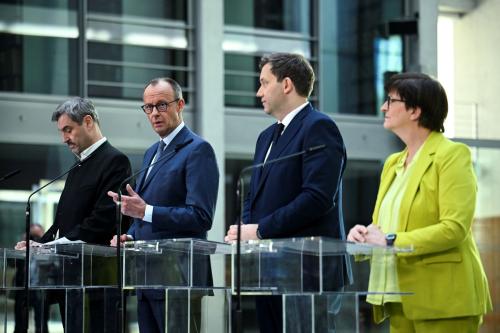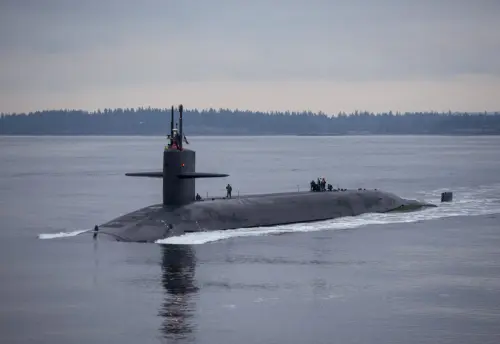On December 8, Brookings expert Steven Pifer, author of a new Brookings paper The Next Round: The United States and Nuclear Arms Reductions After New START, answered your questions in a live chat, moderated by POLITICO, about what the treaty means to the global community and the importance of taking action soon.
The transcript of this chat follows.
12:30 Seung Min Kim: Good afternoon everyone. We’re here with Steven Pifer, who’ll talk about the implications of the New START. Welcome, everyone.
12:30 [Comment From Jennie: ] What’s at stake for the U.S. if the treaty isn’t ratified soon?
12:31 Steven Pifer: If the Senate doesn’t ratify New START soon, it delays having its verification measures in place — data exchanges, notifications, inspections, etc. These give the U.S. military a lot of information about Russian nuclear forces that it will not have otherwise, and helps to avoid worst-case assumptions. So there is a cost to delay.
12:31 [Comment From Nate: ] What do you expect from Russia if the vote on START gets held up?
12:32 Steven Pifer: A bit of friction, but no big problem as long as the treaty ultimately gets ratified. If the treaty in the end does not get ratified, expect a lot less cooperation from Moscow on things that the United States cares about, such as Iran and Afghanistan.
12:32 [Comment From dave: ] how is new start different from start 1?
12:34 Steven Pifer: The new treaties’ counting rules are a bit of apples and oranges. START I limited each side to 6000 strategic warheads on 1600 ICBMs, SLBMs and heavy bombers. New START limits each side to 1550 strategic warheads on 700 ICBMs, SLBMs and heavy bombers. New START means a significant reduction compared to START I but, again, the counting rules are not exactly the same.
12:34 [Comment From Sam D.: ] Do you think it’s likely the Senate will vote on START before the end of this session?
12:36 Steven Pifer: I believe in the end the Senate will ratify New START. The national security arguments are compelling, and serious Republican senators would have a hard time explaining why they ignored the unanimous advice of the U.S. military and every former Republic secretary of state, secretary of defense and national security advisor who has spoken on the treaty. Whether it gets done this month is a tougher call, and probably depends on the rest of the agenda. The administration clearly wants to get it done.
12:36 [Comment From Sally: ] One question is the modernization issue. The Republicans who were opposing it are now making a big deal out of this. Could you say something about it since it seems that the Obama administration has gone a long way in trying to meet their concerns.
12:38 Steven Pifer: Senator Kyl and other Republicans have sought administration commitments to fund modernization of the nuclear weapons complex (the infrastructure that maintains the reliability and safety of the nuclear arsenal). The administration has promised $85 billion over the next ten years — a significant plus-up. It seems to be having some effect, as more Republican senators are leaning toward support of the treaty.
12:39 [Comment From Ephren: ] when speaking about the Russian relationship with Iran, I’m wondering if there’s an incentive beyond the economic one to, you know, go ahead and renew the agreement to give them the surface-air missiles. And would Russia see Iranian nuclear capability as a threat if they weren’t receiving pressure from the United States?
12:41 Steven Pifer: The Russians don’t want a nuclear-armed Iran, but it’s not the same nightmare scenario for them that it is for Washington. As a result of the reset — driven in large part by New START — Moscow has adopted a much tougher stance on Iran over the past year, supporting economic sanctions and canceling its planned surface-to-air missile sale. We want them to continue to do this.
12:41 [Comment From Igor: ] Who needs this START treaty more, the United States or Russia? The reason I am asking this question is, when listening to the public statement — statements by certain U.S. politicians, especially newly elected Republican Party representatives or senators, I have a feeling that they’re doing favor to Russia by signing arms-control treaties or by ratifying arms-control treaties. Correct me if I — if I am wrong in my perception.
12:43 Steven Pifer: The treaty is good for both sides. Russia wants the agreement to ensure that U.S. strategic forces reduce as Russian forces come down. The U.S. wants the treaty to cap Russian forces, provide verification and transparency measures, and to bolster its ability to raise the bar against proliferation.
12:43 [Comment From Pamela: ] Is there a connection for the Russians between the conversations that they’ve now agreed to begin with NATO on the conventional missile defenses to — for Europe and this START treaty being approved? Either on a substantive level or on a political level?
12:46 Steven Pifer: I think the New START treaty stands on its own. Russian agreement to explore missile defense cooperation with NATO could, however, be very important in the future. If NATO, the U.S. and Russia are working together on missile defense, it should defuse this as an issue between Washington and Moscow. And the Russians will be smarter about what the U.S. missile defense system can do — Washington has said that the system is intended against North Korean or Iranian missiles but would not be able to deal with a Russian attack. With more cooperation and openness, Moscow might be more relaxed about its strategic deterrent.
12:46 [Comment From Sasha: ] What is more important for the U.S. and Russia, respectively, START or WTO?
12:47 Steven Pifer: It’s hard to compare. New START is good for the security of both sides. WTO brings Russia into the trade rules that govern most countries. Happily, it’s not an either/or choice.
12:47 [Comment From Doyle: ] The conventional wisdom is that if Putin wants to run for president again he gets to run for president, and he controls enough of the machinery that he also gets to win. So it’s not — it’s not that this is going to affect the outcome of the 2012 election in Russia, is it? But is it a question of, okay, Obama and Medvedev have invested a lot in the relationship with each other, and much or all of that goes up in smoke if Medvedev doesn’t get this?
12:49 Steven Pifer: I assume, and I believe the U.S. government assumes, that the main foreign policy lines pursued by Medvedev — including New START — are done so with the concurrence of Putin. The good relationship between Obama and Medvedev helps, but it is based on the countries’ interests.
12:50 [Comment From Leandro: ] How would you characterize GOP opposition to the New START treaty? Are there legitimate concerns over lack of transparency–several R Senators have stated that it requires more discussion, is that valid? Or are they using it as a political bargaining chip?
12:52 Steven Pifer: Republicans have raised legitimate questions, but they were largely answered over the summer. The debate since August has focused on the nuclear modernization issue. Some Republicans, however, they don’t like arms control or the president. There’s no doubt in my mind that, had this treaty been signed by a Republican president, it would have been ratified already with more than 85 votes in favor.
12:52 [Comment From Guest: ] If the treaty is good is there any harm in waiting till January to ratify it. Why the rush?
12:55 Steven Pifer: I guess the question is why not ratify now? This Senate has had the treaty for eight months. There were 20+ Senate hearings and briefings, and the administration provided answers to more than 950 questions for the record. A delay is not just until January, moreover, since the treaty would have to go back to the new Senate Foreign Relations Committee. And the more time goes by, the longer we have without the treaty’s verification and transparency measures, so we know less than we could about Russian nuclear forces.
12:55 [Comment From armen: ] If you look at the vote of the Senate Foreign Relations Committee to move the treaty out of committee, you got a strong bipartisan vote. I believe it was 14-to-4 in favor of the treaty when Foreign Relations voted back in October. Why is the treaty in trouble now?
12:57 Steven Pifer: Three Republicans joined with all the Democrats in the SFRC vote to endorse New START’s ratification. The question has been timing for floor consideration. Interestingly, Senator Kyl, who now says there may not be time in the lame duck session, several months ago suggested that the lame duck session was precisely the time to vote to ratify. If they can clear a couple of other agenda items, there should be time — they need 3-4 four days — for full Senate consideration.
12:58 [Comment From Tracy Wilson: ] The START treaty had a 15-year duration, with the ability to extended for successive 5-year periods by agreement among the Parties. The New START treaty’s duration, if ratified, will be 10 years, unless superseded by a subsequent agreement, and the Parties may agree to extend the treaty for a period of no more than 5 years. Given the current ratification experience, should future treaties have an indeterminate duration, i.e., remaining in-force until superseded (or a Party withdraws)? Would the US and Russia agree to such a provision?
1:01 Steven Pifer: Washington and Moscow have done indefinite duration treaties in the past, the 1987 treaty banning intermediate-range nuclear forces, for instance. Making New START of indefinite duration would have been a tougher question. The Russians worry about future U.S. missile defense developments, so they probably don’t want to sign on to an indefinite treaty. Washington saw New START as a bridge to a new agreement that might provide deeper cuts and include things such as tactical nuclear weapons. So a ten-year treaty, with the possibility for extensions, probably answers both sides’ requirements.
1:01 Seung Min Kim: And that’s it for today. Thanks for a great chat on New START and a special thank you to our expert, Steven, for leading the discussion.
The Brookings Institution is committed to quality, independence, and impact.
We are supported by a diverse array of funders. In line with our values and policies, each Brookings publication represents the sole views of its author(s).


Commentary
Web Chat: The New START Treaty
December 8, 2010